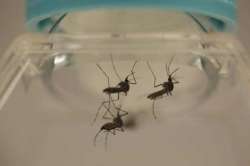DOs and DON'Ts to keep in mind to avoid dengue and chikungunya
Delhi is currently in the midst of fighting a dangerous surge of cases chikungunya and dengue. According to latest reports, the toll of chikungunya cases in the national capital has risen to 432 and dengue

Delhi is currently in the midst of fighting a dangerous surge of cases chikungunya and dengue. According to latest reports, the toll of chikungunya cases in the national capital has risen to 432 and dengue cases have gone up to 487, plus two deaths till August 27.
While avoiding mosquito bites is the best way to prevent chikungunya and dengue fever, there are certain things one must keep in mind to reduce the effect of the disease.
Here are some important facts about the symptoms of dengue and chikungunya, and the preventive measures that can be taken to avoid infections.
DENGUE -SYMPTOMS
The primary symptoms of dengue include high fever, which occurs with at least two of the following symptoms: severe headache, severe eye pain, joint, muscle or bone pain, rash, mild bleeding from the nose or the gums, small spots caused by bleeding into the skin, and low white cell count.
Severe dengue can entail plasma leakage leading to shock, hemorrhage (internal bleeding), and organ impairment. At this stage, the disease is potentially fatal.
CHIKUNGNYA - SYMPTOMS
Chikunguniya symptoms include high fever, severe joint pain, joint swellings, muscle pain, headaches and rashes. It is mostly non-fatal.
Here are some DOs:
1) If you have the disease, consume plenty of water and take proper rest.
2) Get tested immediately if any of the symptoms above manifest themselves. If you have a high-grade fever for more than twenty four hours, go see a doctor.
3) Use mosquito nets and wear long sleeves and pants to avoid being bitten.
4) Keep your surroundings clean, and dispose of waste regularly.
Here are some DON'Ts:
1) Aedes mosquitoes - which transmit both dengue and chikungunya - breed in clean water. So never leave water in containers, coolers, and other such recipients exposed to the air. Don't let water collect anywhere in or near your home.
2) If you are using mosquito repellents, don't use them on children below two months of age. Don't apply mosquito repellent on your palms, or near your eyes or mouth. You must read instructions before using repellents.
3) Mosquitos are attracted to dark colours, so avoid wearing dark-coloured clothes.
4) As mosquitoes find it easier to bite through tight-fitting garments, avoid wearing tight clothes